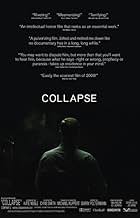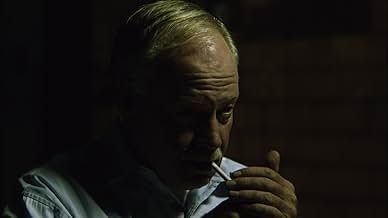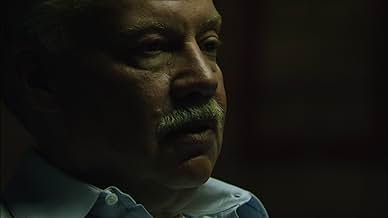अपनी भाषा में प्लॉट जोड़ेंA documentary on Michael Ruppert, a police officer turned independent reporter who predicted the current financial crisis in his self-published newsletter, From the Wilderness.A documentary on Michael Ruppert, a police officer turned independent reporter who predicted the current financial crisis in his self-published newsletter, From the Wilderness.A documentary on Michael Ruppert, a police officer turned independent reporter who predicted the current financial crisis in his self-published newsletter, From the Wilderness.
- निर्देशक
- लेखक
- स्टार
फ़ीचर्ड समीक्षाएं
I would like to have had more info on a lot of his quotes but I guess that would likely take an 80 minute documentary into like 3 or 4 hours (which I wouldn't have minded). I might just buy some if his books to take a look to see how much more in depth he gets on most of the topics he covers in this documentary.
For me, watching this, it was like it's about time. What I mean by that is finally someone who doesn't come across as a street corner preacher or a bona fide nut. This guy is just talking about real issues that matter, or at least they should matter.
But the real element that grabs you is Smith's subject. Ruppert will be seen by some as a prophet and by others as a nutcase but he has a magnetism on screen that is undeniable. This ex-cop is well-spoken it is very obvious that he has given conferences and presentations as he begins to explain his theories.
The main point Ruppert is trying to get across is undeniable. Our planet has finite resources which will not be able to sustain our current way of life indefinitely. But Ruppert's actual discourse will never be confused with a green activist as he veers constantly into subjects such as peak oil, politicians and banks. Where Ruppert is more questionable is when he mixes opinions with facts.
Ruppert repeats that he is not a conspiracy theorist yet often acts like ones. He constantly cites people, studies and historic events that favors his point of views and ignores the rest. These are old techniques that have been used by countless gurus, theorists and leaders and Ruppert does it very effectively.
This mix of truth and speculation works because the part that is truth is monumentally percussive: We as a species will not be able to live this way forever.
Ruppert posits that the system is crashing down fast but you don't have to believe this to enjoy this documentary. He interprets all sorts of world events as symptoms and yet again, you can take it or leave it. He claims he has been shot at and that US presidents have taken a personal interest in him without offering any evidence and you can discard this. He makes a compelling argument that alternative energies we are exploring are not sustainable/viable in their actual form but you can choose to disagree. He lashes at the deficiencies of globalization and you could ignore that too.
What you can't ignore is that change will have to happen. Smith seems confident that the audience will make up their minds about Ruppert and his theories. You do not have to share Ruppert's quasi-apocalyptic vision of the future to have a great time watching this.
Despite the praise, Collapse is not without a few flaws. I wished more time had been devoted to questioning Ruppert's wilder claims. Shot at? When? Where? Who? I also thought Ruppert's angle was too focused on the US and would have loved to hear his opinion on China and a few other things.
But overall, this is a nice documentary with an air of political thriller to it. Whether it is academic or objective, is left for each viewer to decide.
1. Ruppert discounts human ingenuity.
Having the benefit of the internet and the ability to research, you will find that even generous estimates tell us that any new power grid would take 30 years to establish. This means that if aliens came down to earth and gave us a perfect technology that required no input and had zero emissions it would still require a lot of oil and time to build an infrastructure to support it. The fact is oil has artificially increased our carrying capacity and when its gone, the excess population will go with it. The standard of living we all have come to demand will likely never return and certainly not for 7+ billion people. (not that we all have Hummers and flat screens now)
2. The San Francisco (chronicle?) lauds the moment Ruppert cries because they think he is lamenting the fate of humanity.
I think it's highly likely, and more compelling to look at the beginning of the documentary where he says he's lost his fiancé to betrayal and only has his dog, the beach, and this movement to get him by. He's crying because he thinks it will take a community to survive in the aftermath of the collapse, and he has no loved ones.
However, gloomy is one thing. Being deadly accurate in nearly all predictions is another thing altogether. Ruppert, and his team at From the Wilderness (his newsletter) have been bang on the money when it came to oil prices, housing prices, and of course the collapse of the US housing market, and in other areas as well including drugs, the CIA and 9/11 itself. Ruppert being an ex LAPD narcotics officer who was born into an intelligence family, has had experience in seeing truth where others bury their heads in the sand. When he tried to bring to light evidence that the CIA was dealing drugs within the USA, he was shot at and forced off of LAPD. This was only the beginning of his investigative career, and of the vicious repercussions he suffered because of it. In November of 2004, his book "Crossing the Rubicon: The Decline of the American Empire and the End of the Age of Oil" went largely unnoticed, even though it could serve as a final nail in Dick Cheney's political coffin concerning his culpability for 9/11. Ruppert has said, "This is a book that I, as a detective, would... drop in the lap of a DA and say, 'I want a filing for murder, premeditated, first degree, multiple counts with special circumstances." The best part: he makes no mention of bombs in buildings, or holes in the pentagon, or molten metal, but merely treats the case as another crime to be pieced together and solved. His conclusions are staggering.
And in light of this, to hear what he predicts is yet to come is guaranteed send a chill down your spine, even if you don't believe him. And what does he predict? Nothing short of the collapse of industrialized civilization itself. How could this ever happen? Quite simply, the world runs out of oil. Since everything we do is dependent upon oil... well it's probably best if I let Ruppert speak for himself.
The film plays like one of Ruppert's more impassioned talks, albeit with some cinematography added in to keep the eye amused. We are in an undefined space that looks like a bunker, or an interrogation room. Ruppert sits in a chair, smoking cigarettes (presumably to calm his nerves, or as he's been known to say "I smoke as many cigarettes as I want to, but not nearly as many as the movie would have you believe") and tells us what's on his mind. And by the time you're done seeing "Collapse" it'll be on your mind too... no matter how hard you try not to believe it.
What makes "Collapse" so much more powerful than the angry rants and shenanigans of Michael Moore is that while Moore may be passionate about what he's talking about, it's clear that Ruppert is more than passionate... he's scared to death. What's worse, and also unlike Moore who has received greater publicity than many fiction filmmakers, Ruppert has suffered from a kind of Cassandra syndrome for sometime. His writings and speeches are prophetic and yet, until recently, he has gone mostly unnoticed by the majority of people. Despite this, he's cracked open some of the biggest cases of all time: the CIA dealing drugs, empirical evidence that Dick Cheney was directly responsible for thousands of deaths on 9/11, and most recently, the collapse of the global housing market. It's not difficult to picture a similar but more ancient voice shouting "Don't let the horse through the gates of Troy! It will bring ruin!" only to be met with violence and humiliation.
As is true with so many visionaries, Mike Ruppert is just now beginning to be heard... and like so many useful visions, the realization is coming too late.
All of his concerns are true, and some are even worse than he stated, but the very worst problem of all didn't even get a mention from him....that of global overpopulation that is the root cause of all the symptoms of our existence troubles that he did state.
To simplify......if the world's population was 20% of what it is now, the maximum sustainable figure, all of Ruppert's concerns for human existence would not be crucial for thousands more years when real solutions to the problems he stated might be available. But, we cry about the symptoms and don't care one bit about the cause so we continue to overpopulate all countries with uncontrolled new births, and are continually overburdened with resultant and mostly unsolvable problems as a result. Air, water, oil, food, and every single other problem of today that Ruppert stated has been caused by overpopulation, but still we cry only about symptoms, as Ruppert does, instead of the root cause of all our global problems....too many people being born with no controls on it and, what is much worse, no gov't or societal thought even being given to it.
As a result of that typical human stupidity and shortsightedness we are done, people, it is just a matter of time, and not that much time either, as your own young grandchildren will suffer badly as a result. But, still you don't care, so nothing is ever done about it. We don't deserve any more time on earth if we don't even care enough about protecting our continued existence by working on the cause of all of our problems.
क्या आपको पता है
- ट्रिवियाAccording to director, Chris Smith, they initially agreed the primary subject was supposed to be the CIA's connections to drug smuggling within the Iran-Contra affair, specifically Ruppert's collaboration with Pulitzer Prize-winning reporter Gary Webb's mid-1990's investigative series, "Dark Alliance." But Ruppert didn't want to talk about the CIA. Instead, he wanted to talk about peak oil, and its critical implications for the future.
- भाव
Michael Ruppert: It's kind of sad because we as a species have become so disconnected from the Earth. We don't have any real contact with the Earth. We don't have any sense of its functions, its feeling, its seasons, its timings.
- कनेक्शनReferenced in Film Junk Podcast: Episode 235: TIFF Report, Part 1 (2009)
- साउंडट्रैकCollapse
Performed by Karli Larsen, Didier Leplae, Joe Wong
टॉप पसंद
- How long is Collapse?Alexa द्वारा संचालित
विवरण
बॉक्स ऑफ़िस
- US और कनाडा में सकल
- $46,964
- US और कनाडा में पहले सप्ताह में कुल कमाई
- $7,800
- 8 नव॰ 2009
- दुनिया भर में सकल
- $46,964
- चलने की अवधि1 घंटा 22 मिनट
- रंग
इस पेज में योगदान दें



















